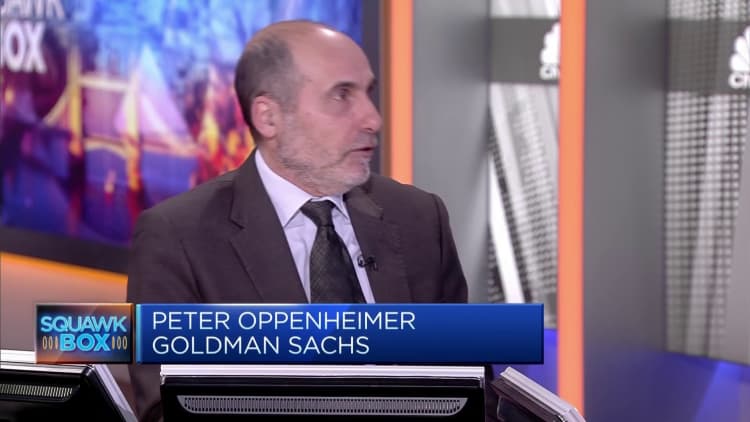A screen displays the Dow Jones Industrial Average after the closing bell on the floor at the New York Stock Exchange on Dec. 13, 2023.
Brendan Mcdermid | Reuters
The global economy is moving into a new “super cycle,” with artificial intelligence and decarbonization being driving factors, according to Peter Oppenheimer, head of macro research in Europe at Goldman Sachs.
“We are moving clearly into a different super cycle,” he told CNBC’s “Squawk Box Europe” on Monday.
Super cycles are commonly defined as lengthy periods of economic expansion, often accompanied by growing GDP, strong demand for goods leading to higher prices and high levels of employment.
The most recent significant super cycle that the world economy experienced began in the early 1980s, Oppenheimer said, discussing content from his newly launched book “Any Happy Returns.”
This was characterized by interest rates and inflation peaking, before a decadeslong period of falling capital costs, inflation and rates, as well as economic policies such as deregulation and privatization, he explained. Meanwhile, geopolitical risks eased and globalization grew stronger, Oppenheimer noted.
But not all of these factors are now set to continue as they were, he added.
“We’re not likely to see interest rates trending down as aggressively over the next decade or so, we’re seeing some pushback to globalization and, of course, we’re seeing increased geopolitical tensions as well.”
The Russia-Ukraine war, tensions between the U.S. and China largely relating to trade, and the Israel-Hamas conflict which is raising concerns on the wider Middle East are just some geopolitical themes that markets have been fretting over in recent months and years.
While current economic developments should theoretically lead to the pace of financial returns slowing, there are also forces that could have a positive impact — namely artificial intelligence and decarbonization, Oppenheimer said.
AI is still in its early stages, he said, however as it is used increasingly as the basis for new products and services, it could lead to a “positive effect” for stocks, he said.
The hot topic of AI and productivity, which has often gone hand in hand with debates and concerns around human jobs being replaced or changed, will likely impact the economy.
“The second thing is [that] we haven’t yet seen, and I think we’re relatively positive that we will see, [is] an improvement in productivity on the back of the applications of AI which could be…
Click Here to Read the Full Original Article at Top News and Analysis (pro)…


